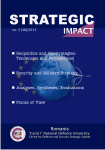IMPLICATIONS OF THE TRANSITION TOWARDS MULTIPOLARITY ON NATO-EU RELATION
IMPLICATIONS OF THE TRANSITION TOWARDS MULTIPOLARITY ON NATO-EU RELATION
Author(s): Cristina BogzeanuSubject(s): International relations/trade, Security and defense, Geopolitics
Published by: Carol I National Defence University Publishing House
Keywords: multipolarity; NATO; EU; US; transatlantic partnership; transatlantic space; Asia-Pacific region;
Summary/Abstract: International security environment passes through a period of ample changes determined by the economic and financial crisis. One of the most notable such changes can be found at the level of the international system’s polarity, embodied in the multiplication of the number of centers of power. Nevertheless, although the emergence of new centers of power is a clear fact, until presently, none of them has equaled US power and influence. Actually, currently, the world is in a transit stage from unipolarity to multipolarity, international actors being in full process of reconsidering and readapting their foreign policies to the new trends characterizing the international security environment. Irrespectively of the actor one might take into consideration, the only possible conclusion is that we are witnessing a period of transformations, conversions, of finding a new optimal course for each and every actor. NATO and EU are no exception from this common direction. Both of them are in search of objective strategic lines, according to the new international realities, which will define the security level in the Euro-Atlantic space. The present paper represents an analysis of these transformations triggered by the mutations happened at international level, starting from the effects generated by the emergence of a multipolar international system on the US, an actor playing a major role in the preservation of the Euro-Atlantic security. This study premises that the Euro-Atlantic partnership remains of crucial importance for the actors on the two shores of the Atlantic, but it emphasizes, through recent events’ analysis, the difficulties the two organizations have in adapting to a rapidly changing international context.
Journal: Strategic Impact
- Issue Year: 2013
- Issue No: 48
- Page Range: 6-14
- Page Count: 9
- Language: English

